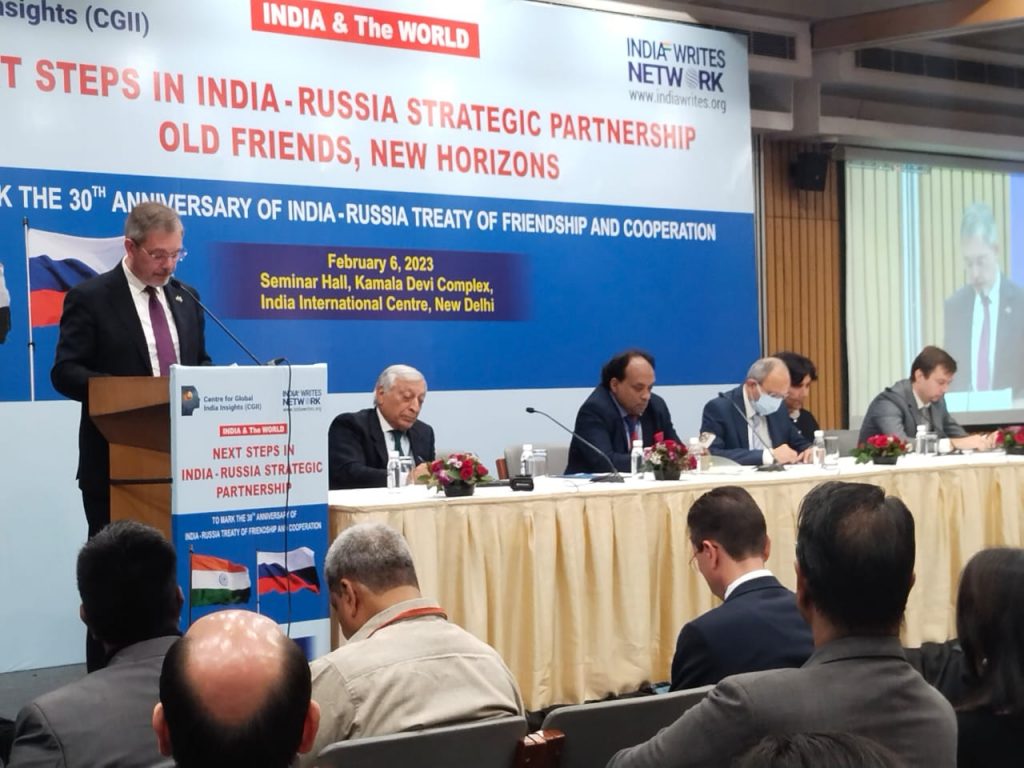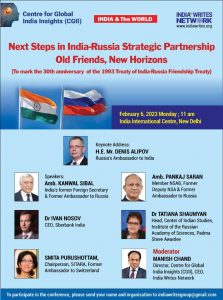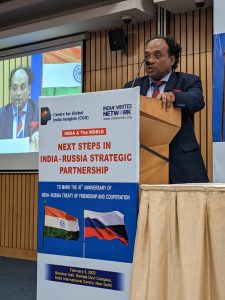By Sanjay Kumar

Amid a challenging international environment, Russia’s Ambassador to India Denis Alipov admitted that the India-Russia ties are under stress due to western sanctions, but underlined that the ties between the two historical partners are moving ahead and expanding in crucial areas, including trade and investment, defence and technologies.
“There has been much debate lately where the India-Russia relationship stand at the current juncture”, said Mr Alipov at a panel discussion organized by India Writes Network and Centre for Global India Insights (CGII), a New Delhi-based think tank and research advisory, on February 6. “Today, our ties are under stress and we face a tectonic geopolitical shift that has been underway for quite some time but accelerated last year by crossing the red line in Europe not by us but by the so-called collective west led by the US”, said Mr Alipov at the panel discussion entitled, “Next Steps in India-Russia Strategic Partnership.”
“Sanctions disrupted transaction and logistics mechanisms, causing insurance issues. On all these issues, we are in very close dialogue. There are very precise and concrete suggestions and a very professional exchange of ideas and proposals from both sides,” he said.
The conference was organized to mark the 30th anniversary of the Indo-Russia Treaty of Friendship and Cooperation. In 1971, India and the erstwhile USSR signed the Indo–Soviet Treaty of Peace, Friendship and Cooperation for 20 years. In 1991, the duration of the treaty was extended for another 20 years. However, after the dissolution of the Soviet Russia, the old treaty was replaced by a new one in 1993 during the visit of the then president Boris Yeltsin to New Delhi.

The conference featured eminent diplomats and experts as speakers. These included: Kanwal Sibal, India’s former foreign secretary and a former ambassador of India to Moscow; Pankaj Saran, a former ambassador of India to Russia; Dr Ivan Nosov, CEO of Sberbank; and Smita Purushottam, a former ambassador of India to Switzerland. Dr Tatiana Shaumyan, head of the Center of Indian Studies at the Institute of Russian Academy of Sciences, joined virtually from Moscow.
Placing the conference in the context of post-Ukraine developments, Manish Chand, Founder-CEO, India Writes Network and Director, Centre for Global India Insights (CGII). “Revisiting the past of the India-Russia relations is especially useful and provides a foil to the pugnacity and quibbles of the present”. He underlined that “vested interests are wilfully spreading negativity about India-Russia relations and “a war of narratives going on, with truth becoming a casualty”.

“The key strategic goal of the conference is to help provide a big-picture nuanced view and deep perspective from leading Indian and Russian diplomats and experts so that the “special and privileged strategic partnership between India and Russia” continues to scale new frontiers in days to come”, said Chand, who is also Editor-in-Chief, India and the World magazine-journal.
“US is good at advertising”
After the start of the Ukraine-Russia conflict early last year, India has been under great pressure from the western world to shun Moscow and give unstinted support to the western allies. New Delhi, however, has refused to toe the West’s line and has not termed the conflict in Europe as war. The ambassador appreciated India’s position and added that “our relationship has always been friendly, equal, trusted and robust. It’s comprehensive and we want them to be diversified, mutually beneficial and supportive. They are not aimed against any one – respecting each other’s interests and meeting the core aspirations of our nations”.
The ambassador called the US “the most arrogant and belligerent nation on this earth which was persuaded in its righteousness and rejected all our proposals to negotiate”. He said that unlike the US, Moscow doesn’t mix technology transfer with politics. Taking a swipe at the US, the Russian envoy stressed that Russia provides technology transfer to India. What the US is good at is advertising,” he said.
Mr. Alipov stressed that Russia does not “mix technology transfer with politics” in its defence collaboration with India. “It’s sometimes amusing to hear about the US bragging about its defence collaboration with India, as if it provides anything distinctive.” “Nothing comes close to the degree of advanced technological transfers we provide,” he added. “What the US is good at is advertising by portraying the poor performance of Russian weapons in Ukraine”. Talking about the world that has evolved after the Russia-Ukraine conflict, the ambassador said that “the world is irreversibly moving towards a polycentric world order which India and Russia always advocated for”.
The envoy stressed that Moscow has proven to be a reliable partner for New Delhi. “The reason for the strong friendship between both countries is that their national interests coincide on a universal basis. Both nations aspire to democracy and equality in international relations and respect each other’s actions,” he said.
Moving forward Mr. Alipov pointed out that the bond between India and Russia is also strong because “we share the same values and principles.” “These principles were enshrined in the treaty of friendship and cooperation that both countries signed 30 years ago. This fundamental document reflects our commitment to mutual respect, equality, and beneficial nations. Both the countries have formed a very rich architecture of cooperation: maintaining executive contacts at various levels, annual summits, inter-parliamentary commissions, and the 2+2 dialogue, which was initiated in 2021.”
(Tanya Kala contributed inputs for this article)
Author Profile
- India Writes Network (www.indiawrites.org) is an emerging think tank and a media-publishing company focused on international affairs & the India Story. Centre for Global India Insights is the research arm of India Writes Network. To subscribe to India and the World, write to editor@indiawrites.org. A venture of TGII Media Private Limited, a leading media, publishing and consultancy company, IWN has carved a niche for balanced and exhaustive reporting and analysis of international affairs. Eminent personalities, politicians, diplomats, authors, strategy gurus and news-makers have contributed to India Writes Network, as also “India and the World,” a magazine focused on global affairs.
Latest entries
 DiplomacyJanuary 5, 2026India walks diplomatic tightrope over US operation in Venezuela
DiplomacyJanuary 5, 2026India walks diplomatic tightrope over US operation in Venezuela India and the WorldNovember 26, 2025G20@20: Africa’s Moment – The Once and Future World Order
India and the WorldNovember 26, 2025G20@20: Africa’s Moment – The Once and Future World Order DiplomacyOctober 4, 2025UNGA Resolution 2758 Must Not Be Distorted, One-China Principle Brooks No Challenge
DiplomacyOctober 4, 2025UNGA Resolution 2758 Must Not Be Distorted, One-China Principle Brooks No Challenge India and the WorldJuly 26, 2025MPs, diplomats laud Operation Sindoor, call for national unity to combat Pakistan-sponsored terror
India and the WorldJuly 26, 2025MPs, diplomats laud Operation Sindoor, call for national unity to combat Pakistan-sponsored terror







